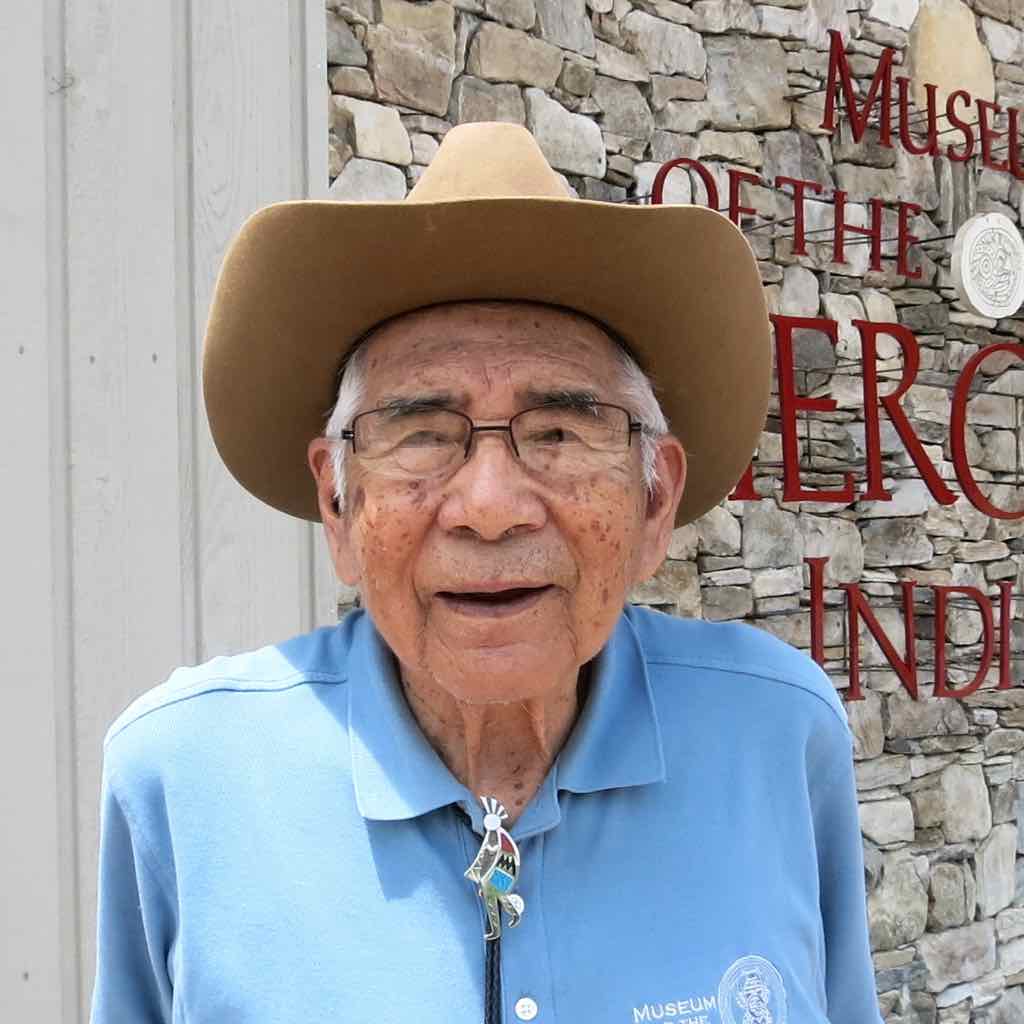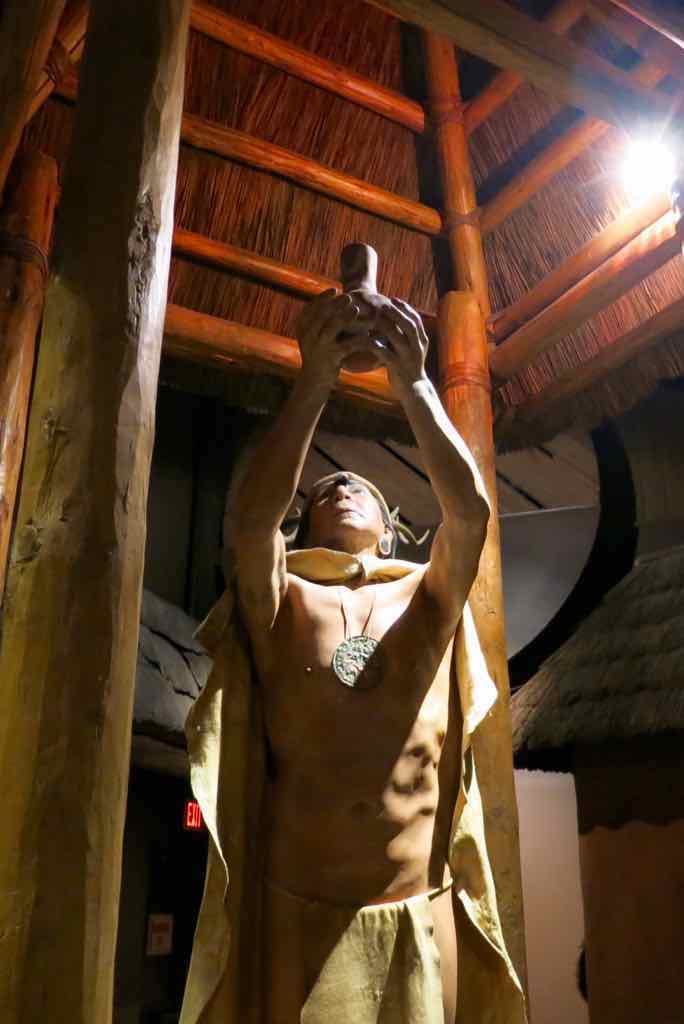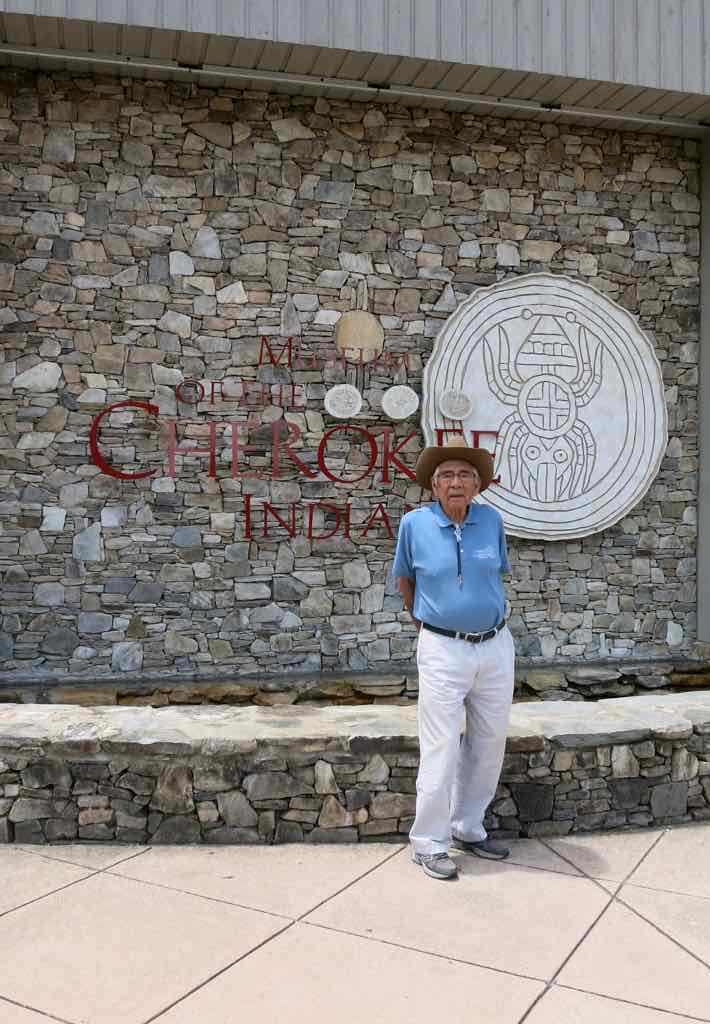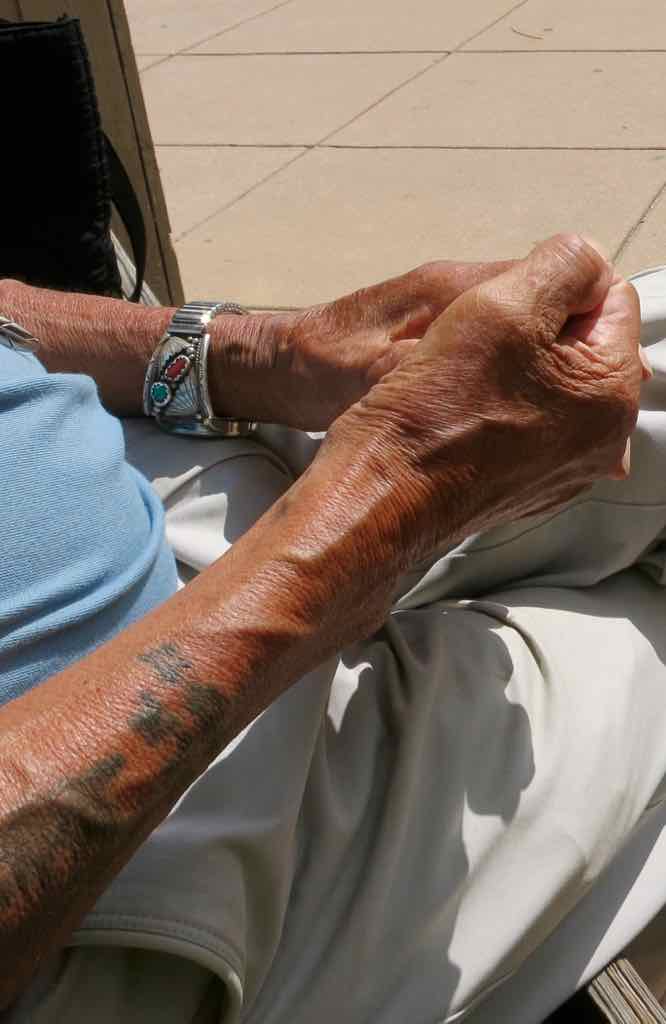
Doing for people, giving them information, greeting the people, offering them help — whatever they ask I try to give them when they come in – it’s the little things it’s not the big things that happen that I do.
1. What led you to the mission of being a Cherokee Beloved Man and Storyteller?
In my younger days of life I never had any knowledge of the museum here or any part of it.  I was a builder. When I turned eighteen years old, I joined the United States Navy. I served in the Atlantic and in the Pacific. I was in both theaters during the war – WWII. I was eighteen years old in 1943.
I was a builder. When I turned eighteen years old, I joined the United States Navy. I served in the Atlantic and in the Pacific. I was in both theaters during the war – WWII. I was eighteen years old in 1943.
I became of age and the war was going on. I volunteered and I was in the invasion of Normandy. I was in that invasion June the sixth 1944. When I returned home on a thirty day leave in 1945 and I returned back to the Navy, I got on a ship in New Orleans and went to Pearl Harbor. I was there for the peace treaty signing of the Pacific.
I was also in the middle of New York City for VE Day in 1945 (Victory in Europe). VE Day came in May. It was the end of that war in Europe. Then when I was discharged in 1949 from the Navy (I stayed 43 to 49 – six years in the Navy), I returned and went to a building trade school under the GI Bill of Rights. I learned carpentry. I learned masonry.  I learned concrete finishing. I learned all of that in the building trades. I did a lot of building throughout the area of Cherokee, North Carolina and neighboring towns like Sylva and Bryson City and even over in Tennessee like Cades Cove and all through there. Any of the buildings you see around the Cherokee Museum, I had a hand in building – even the bank and the post office. I did rock work, brick laying, rock laying and fireplaces.
I learned concrete finishing. I learned all of that in the building trades. I did a lot of building throughout the area of Cherokee, North Carolina and neighboring towns like Sylva and Bryson City and even over in Tennessee like Cades Cove and all through there. Any of the buildings you see around the Cherokee Museum, I had a hand in building – even the bank and the post office. I did rock work, brick laying, rock laying and fireplaces.
I retired and when I retired from the building trades, I was able to teach and I was an instructor for the Job Core Program. That was for young men and school dropouts. I was hired to teach. After I retired from that point in 1985, I did some traveling with the church group building team. I went to Jamaica, to Haiti, Barbados, South Africa, and to many places locally. I went and helped.
Also, I’m with the natural resource program. I still travel. I go to many of the states like Minnesota, Montana, New York, Anchorage, Alaska, Alabama and Florida. I’ve been all over helping. I still do that to this day and travel to help out.
 The way that I was hired in at the Cherokee Museum was that a man came in and complained about how he was treated. He didn’t think he was treated well. I went with him and talked to the manager and coordinator at the museum. We talked about how he was treated. The coordinator said the museum needed a greeter. He asked, “Where can we get a greeter?” There was a lady standing by him when he was saying that and the lady spoke up and said, “You’re looking at him.” And they were looking at me. He said, “Oh, can you do that? Can you be our greeter?” I said, “I never did it in my life. But I’ve talked to a lot of people. But I haven’t talked to them in this manner.” He said, “Would you do that?” I said, “Well, I’m retired and I’m not doing too much now.” So he hired me and I went on a trial. He said I did pretty good so I became a storyteller.
The way that I was hired in at the Cherokee Museum was that a man came in and complained about how he was treated. He didn’t think he was treated well. I went with him and talked to the manager and coordinator at the museum. We talked about how he was treated. The coordinator said the museum needed a greeter. He asked, “Where can we get a greeter?” There was a lady standing by him when he was saying that and the lady spoke up and said, “You’re looking at him.” And they were looking at me. He said, “Oh, can you do that? Can you be our greeter?” I said, “I never did it in my life. But I’ve talked to a lot of people. But I haven’t talked to them in this manner.” He said, “Would you do that?” I said, “Well, I’m retired and I’m not doing too much now.” So he hired me and I went on a trial. He said I did pretty good so I became a storyteller.
I’ve worked here seventeen years after I have retired. A great day of my storytelling I learned at the museum. I learned a great deal of history, background, traditions, and culture. I knew a lot of it but learned a lot more at the museum.
2. What does this mission mean to you?
I meet people from all over the world – all over the country and all over the world. I talk to groups. On Fridays we have storytelling.
3. What was your best day being a Cherokee Beloved Man and Storyteller?
I don’t have a schedule to go by and don’t have any special day except Fridays and the storytelling is my best day.
4. What was your worst day being a Cherokee Beloved Man and Storyteller?
I don’t have a bad day. I don’t have arguments with people. I’ve never had any arguments with my supervisors.
5. How did you survive your worst day?
Doing for people, giving them information, greeting the people, offering them help — whatever they ask I try to give them when they come in – it’s the little things it’s not the big things that happen that I do.  My mother taught me a lot. She had been through the fifth grade in school and she learned a great deal. When she graduated from the fifth grade, she was offered a teacher’s job. Today’s education, the fifth grade wouldn’t be too much. But she was offered a teaching job.
My mother taught me a lot. She had been through the fifth grade in school and she learned a great deal. When she graduated from the fifth grade, she was offered a teacher’s job. Today’s education, the fifth grade wouldn’t be too much. But she was offered a teaching job.
In the mean time she always taught me in English. My dad didn’t speak English. He was Cherokee. He and my mother spoke Cherokee language together. But to me, my mother would always talk to me in English. She said, “When you go to school, you’ll have an easier time because you already know English. You can go right on with your studies. I found that to be true because when I did go to school I was seven years old and all the kids my age couldn’t understand me. A lot of the kids would make fun of me because I spoke the English language. They would say, “He is talking ugly talk.” That was when I would speak to people in English. They were jealous of me because I knew English.
When I went into the classroom, some of the kids had already been in the class a year and they failed because of their language. They didn’t speak enough English. Some of the kids would spend two years in the beginner’s class because they didn’t know English. We had a low first grade and then went to the high first grade when they picked up a little more English. Finally they would go to the second grade. That is how it worked.
6. What advice do you have for someone who would like to follow your example?
I would talk to them and find out their goal. Maybe they don’t have a goal. You find where they are coming from and who they are. You ask, “What would you like to be? What would you like to do?” They would give me a starting point and from there I could go with it. I could give them a lot of info on what to do and who to see for help. I would try to get them to seek help. I would try to comfort them too. I would give them some ideas about life and living. That’s about the way you counsel.
- « Previous person: Mike Crowe
- » Next person: Addie Schoenberger